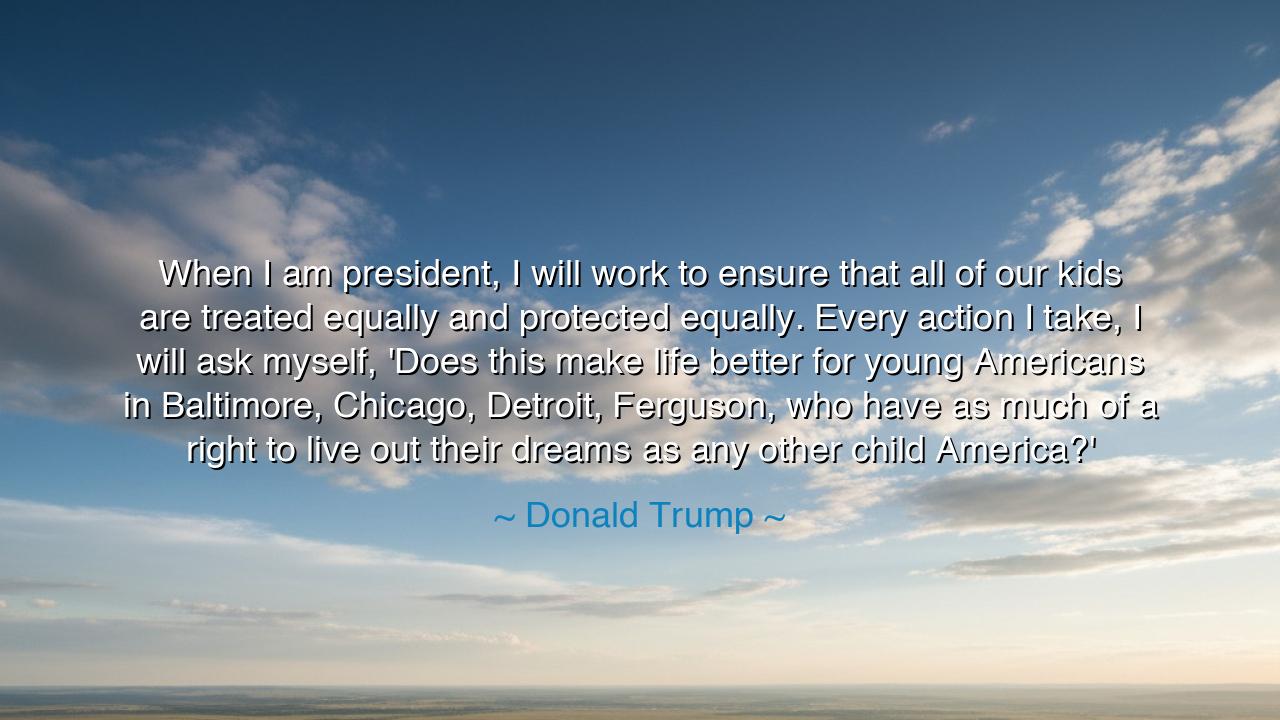
When I am president, I will work to ensure that all of our kids
When I am president, I will work to ensure that all of our kids are treated equally and protected equally. Every action I take, I will ask myself, 'Does this make life better for young Americans in Baltimore, Chicago, Detroit, Ferguson, who have as much of a right to live out their dreams as any other child America?'






In the words of Donald Trump, "When I am president, I will work to ensure that all of our kids are treated equally and protected equally. Every action I take, I will ask myself, 'Does this make life better for young Americans in Baltimore, Chicago, Detroit, Ferguson, who have as much of a right to live out their dreams as any other child America?'" These words echo the age-old principle of justice, equality, and the moral duty of leadership. At the heart of this statement is the recognition that every child, regardless of their background, deserves the same opportunity to pursue their dreams and realize their fullest potential. The quote speaks to the enduring struggle for equality and the commitment to creating a society where all, especially the most vulnerable, can flourish.
When Trump speaks of the children in cities like Baltimore, Chicago, Detroit, and Ferguson, he is speaking to a legacy of disparity—places where economic struggles, systemic injustices, and racial tensions have long cast shadows over the dreams of young people. These cities represent a painful truth that some children in America, simply by the luck of birth, are born into environments that limit their opportunities. The inequity of such circumstances stands in stark contrast to the ideals upon which the nation was built. And yet, Trump’s commitment to equality seeks to address this imbalance, asking a crucial question: “How can we ensure that all children, regardless of where they come from, have a fighting chance to pursue their dreams?”
This sentiment mirrors the ancient wisdom of Solon, the Athenian lawgiver, who believed in creating laws that ensured fairness and equality for all citizens, regardless of their birthright. Solon’s reforms were driven by the idea that no one should be held back by circumstance, and that every individual, no matter their origins, should have an equal opportunity to prosper. Trump’s words reflect a modern reimagining of this ancient wisdom. By focusing on equality for all, he is invoking the timeless truth that the greatest strength of a nation lies in its ability to uplift all of its people, not just the privileged few.
Consider the legacy of Abraham Lincoln, who, during the darkest days of the nation, recognized that freedom and equality must be granted to all people, especially the enslaved African Americans. Lincoln’s decision to issue the Emancipation Proclamation was not merely a political move but an act of moral courage, a commitment to the ideal that all men and women, regardless of race, have the right to pursue their dreams in a land of freedom and opportunity. His leadership changed the course of history, showing that it is the duty of those in power to ensure that every citizen is given the same opportunity to succeed.
Trump’s words also remind us of the need for accountability in leadership. The commitment to asking, "Does this make life better for young Americans in Baltimore, Chicago, Detroit, Ferguson?" is not merely a rhetorical question but a call for reflection in every action taken. The leader must measure his policies not by their success in wealthy enclaves but by their impact on those who have been historically left behind. This reflects a deeper understanding of justice, which is not about rewarding the fortunate, but about ensuring that no one is left behind. The role of the leader is to ensure that the opportunities afforded to the privileged are extended to the underserved and underrepresented.
In our own lives, we must ask ourselves similar questions when we make decisions—whether in our families, workplaces, or communities. Do our actions contribute to the betterment of all, or are they motivated by self-interest? Do we lift up those who have less, or do we let them fall by the wayside? Trump’s call to action is not just about political policy, but about a moral imperative that every individual must confront. As we move through our own lives, let us reflect on the opportunities we create for others, particularly those who may be suffering due to circumstances beyond their control.
The lesson we must take from this quote is that justice and equality are not just abstract ideals, but guiding principles that must shape every action we take, whether as individuals or as leaders. True leadership does not simply serve the needs of the privileged; it seeks to create a world where all can rise, regardless of their background. As we strive to build a more just and equal society, we must always ask ourselves: "Does this make life better for those who have the least?" In doing so, we honor the timeless values that have guided great leaders throughout history and ensure that the dreams of every child, regardless of their circumstances, can one day be realized.






AAdministratorAdministrator
Welcome, honored guests. Please leave a comment, we will respond soon